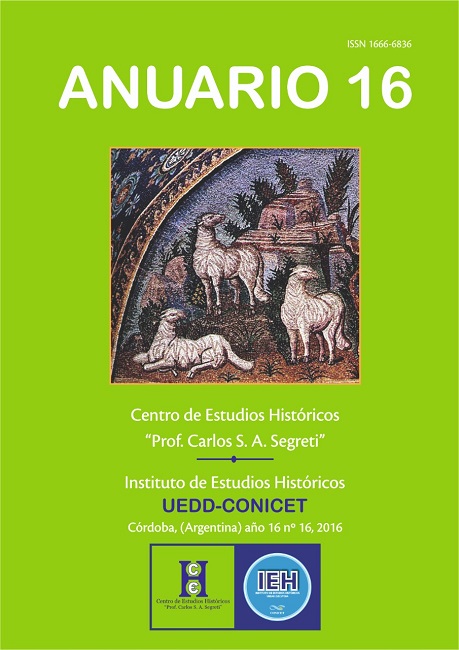The end of emigration from Hispania in the Late Antique period. A problem of mobility, identity or sources?
DOI:
https://doi.org/10.52885/2683-9164.v0.n16.21920Keywords:
immigration, Hispania, epigraphy, origoAbstract
Since the Republic, Hispania was the point of departure and destination of all kind of migrations which have been unequally reflected in ancient sources. While literary ones mention specific sorts or groups more than real persons, epigraphy offers us hundreds of succinct and biased personal stories. A study on the epigraphy recorded in the ancient Italic, Galic and Britanic territories has been carried out in order to determine the characteristics of Hispanic immigration, whose high point took place in the 2nd century AD. The researching is focused on the place of origin of those immigrants whose mentions of origo, natione, domicilium, and ethnic cognomina has been taken into account. From the more than 200 inscriptions considered, only twelve can be dated in the 3rd century AD and one in the 4th. This article will explore the Hispanic immigration outlook and the change which takes place in it from the 3rd century AD.
Downloads
References
ANDREU PINTADO Javier (coord.), Fundamentos de Epigrafía Latina, Madrid, Liceus, 2009.
ANDREU PINTADO Javier, “Sentimiento y orgullo cívico en Hispania: en torno a las menciones de origo en la Hispania Citerior”, Gerión, vol. 1, núm. 26, 2008.
BLÁZQUEZ MARTÍNEZ José María, “Inscripciones de Olearii en Hispalis”, Marc MAYER I OLIVÉ, Giulia BARATTA y Alejandra GUZMÁN ALMAGRO (eds.), XII Congressus Internationalis Epigraphiae Graecae et Latinae: Provinciae Imperii Romani inscriptionibus descriptae: Barcelona, 3-8 Septembris 2002, Barcelona, Institut d’Estudis Catalans, 2007.
BLÁZQUEZ MARTÍNEZ José María y GARCÍA GELABERT PÉREZ María Paz, “Mercenarios hispanos en las fuentes literarias y en la arqueología”, Habis, núm. 18-19, 1987-1988.
CABALLOS RUFINO Antonio, “La romanización de las ciudades de la Bética y el surgimiento de senadores provinciales”, Revista de Estudios Andaluces, núm. 6, 1986.
CALZADA GONZÁLEZ Aránzazu, “Origo, incolae, munícipes y civitas romana a la luz de la lex Irnitana”, RIDROM: Revista Internacional de Derecho Romano, núm. 4, 2010.
CANTO Alicia, “Advenae, externi et longe meliores: la dinastía Ulpio-Aelia”, Maria Gabriella ANGELI BERTINELLI y Angela DONATI (eds.), Le vie della storia: migrazioni di popoli, viaggi di individui, circolazione di idee nel Mediterraneo antico; Atti del II Incontro Internazionale di Storia Antica (Genova, 6-8 ottobre 2004), Roma, Giorgio Bretschneider, 2006.
GARCÍA DE CASTRO Francisco Javier , “Hispani qui in Gallia sunt”, Hispania antiqua, núm. 23, 1999.
GARCÍA MARTÍNEZ María Remedios, “Caracteres y significación socio-económica de los movimientos de población hispana hacia la provincias imperiales en época romana”, Hispania antiqua, núm. 15, 1991.
GUTIÉRREZ MERINO José Carlos, “La presencia de hispanos en la provincia romana de Britannia a través de las fuentes epigráficas”, Liborio HERNÁNDEZ GUERRA, Luis SAGREDO SAN EUSTAQUIO y José María SOLANA SÁINZ (coord.), Actas del I Congreso Internacional de Historia Antigua. La Península Ibérica hace 2000 años. Valladolid, 23-25 de noviembre de 2000, Valladolid, Centro Buendía - Universidad de Valladolid, 2001.
PEREA YÉBENES Sabino, “Las “patrias” del soldado romano en el Alto Imperio”, Espacio, Tiempo y Forma. Serie II: Historia Antigua, núm. 17-18, 2004-2005.
RUBIO ALIJA José, “Españoles por los caminos del Imperio Romano. Estudios epigráfico-onomásticos en torno a Reburrus y Reburrinus”, Cuadernos de Historia de España, vol. 29-30, 1959.
RICCI Cecilia, “Hispani a Roma”, Gerión, núm. 10, 1992.
RICCI Cecilia, Qui non riposa: cenotafi antichi e moderni fra memoria e rappresentazione, Roma, Edizioni Quasar, 2006; Antón ALVAR NUÑO (dir.), El viaje y sus riesgos. Los peligros de viajar en el mundo greco-romano, Madrid, Liceus, 2011.
RICCI Cecilia, Stranieri illustri e comunità immigrate a Roma: vox diversa populorum, Roma, Quasar, 2006.
TODISCO Elisabetta, “La comunità cittadina e ‘l’altro’: la percezione del forestiero a Roma tra tardarepubblica e altoimpero”, Angela DONATI y Maria Gabriella BERTINELLI ANGELI, Le vie della storia. Migrazioni di popoli, viaggi di individui, circolazione di idee nel Mediterraneo antico, Roma, Giorgio Bretschneider Editore, 2006.
Downloads
Published
How to Cite
Issue
Section
License
Aquellos autores/as que tengan publicaciones con esta revista, aceptan los términos siguientes:
- Los autores/as conservarán sus derechos de autor y garantizarán a la revista el derecho de primera publicación de su obra, el cuál estará simultáneamente sujeto a una Licencia de reconocimiento de Creative Commons. Se puede compartir, copiar, distribuir, ejecutar y comunicar públicamente la obra, siempre que: a) se cite la autoría y la fuente original de su publicación (revista, editorial y URL de la obra); b) no se use para fines comerciales; c) no se altere, transforme o genere una obra derivada a partir de esta obra.
- Los autores/as podrán adoptar otros acuerdos de licencia no exclusiva de distribución de la versión de la obra publicada (p. ej.: depositarla en un archivo telemático institucional o publicarla en un volumen monográfico) siempre que se indique la publicación inicial en esta revista.
- Se permite y recomienda a los autores/as difundir su obra a través de Internet (p. ej.: en archivos telemáticos institucionales o en su página web) después del proceso de publicación, lo cual puede producir intercambios interesantes y aumentar las citas de la obra publicada. (Véase El efecto del acceso abierto).


